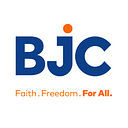Digging past our divides
By Rev. Brittany Stillwell
We gathered in Colonial Williamsburg from our scattered places all over the country, a diverse group of BJC Fellows with various faith backgrounds. This was an event almost two years in the making, finally realized after a delay due to the COVID-19 pandemic. I was excited to meet everyone. We were a diverse group, and this diversity was both intriguing and nerve-racking. We started with small talk: getting acquainted, forming connections and finding common interests as the people we had only experienced behind a screen slowly became real and embodied.
It wasn’t until the first dinner, however, that the group really began to bond. There is something universal about the experience of eating together. It is a mysterious and wondrous thing to behold. At the table, conversations deepen, questions and concerns are raised, and opinions and perspectives are both shared and heard. Over the course of our time together, we would enjoy long, delicious meals full of laughter, spirited debate and meaningful dialogue.
At the table, we would experience first-hand what Dr. Sabrina Dent would later describe in her presentation as one of the central ways we learn to see. “If you have more people at the table who are different,” she reminded us, “then you’ll have to see the issues differently.”
Throughout our time together, we learned to consider new perspectives and to look for the narratives that have been tucked away in the shadows. We invited both Thomas Jefferson and Gowan Pamphlet to help us consider what religious liberty looked like at our country’s founding from very different perspectives. We toured the prison where dissenters who pushed back against established religion would preach from their jail cells. And we stood in the middle of an archeological dig site just eight months into the excavation of the original location of the First Baptist Church in Williamsburg, where Gowan Pamphlet pastored.
As we stood there, right smack in the middle of history, it occurred to me that this is what we were there to do. We were there to dig past layers of casual conversation and biased assumptions, to excavate narratives that had been disregarded and covered up, and to push beyond the prejudices and misconceptions that privileges some while limiting others until we could begin to see the foundation of what held us together: a deep desire to protect the faith and freedom of all people.
And that is what we did. In the intentional and unique space and time carved out for us by the generosity of BJC supporters and the intentional, diligent work of the BJC staff, we began to move from a diverse group of individuals toward a beautiful pluralism, experiencing a glimpse of the archetype of religious liberty for which we strive.
Eboo Patel describes the difference between diversity and pluralism by writing, “Diversity … is simply a demographic fact; pluralism is a hard-won achievement,” in his book Out of Many Faiths. Making space for such a diverse group of people is never easy and requires us all to bring the best versions of ourselves to the table. Patel suggests there are three key ingredients to building an ethic of pluralism: “respect for different identities, relationships between diverse communities, and a commitment to the common good.”
This is what I experienced in the BJC Fellows Program: pluralism made possible by BJC’s long-standing commitment to religious liberty and the intentional ways they lead us all into dialogue and deeper relationship with each other. We came together to learn more about religious liberty, and in doing so we found ourselves free to stand firm in our faith and convictions even as we grew in respect, appreciation and genuine love for those who see the world from a different perspective.
The Rev. Brittany Stillwell is a 2021 BJC Fellow who lives in Little Rock, Arkansas.
